外研版英语必修四 Module 3 Body language and Non-verbal Communication Listening and Vocabulary Pronunciatio
文档属性
| 名称 | 外研版英语必修四 Module 3 Body language and Non-verbal Communication Listening and Vocabulary Pronunciatio | 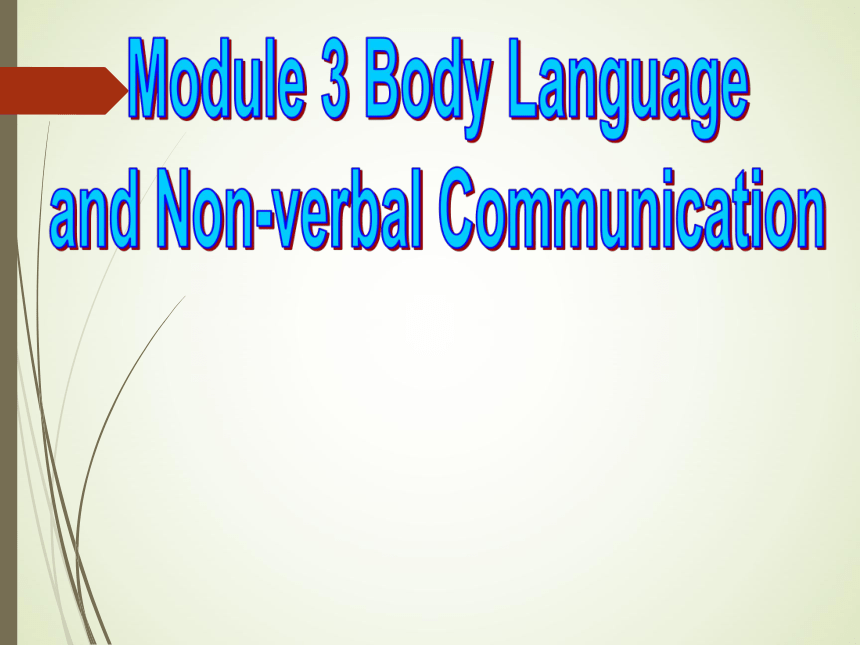 | |
| 格式 | zip | ||
| 文件大小 | 925.0KB | ||
| 资源类型 | 教案 | ||
| 版本资源 | 外研版 | ||
| 科目 | 英语 | ||
| 更新时间 | 2019-05-07 22:06:38 | ||
图片预览

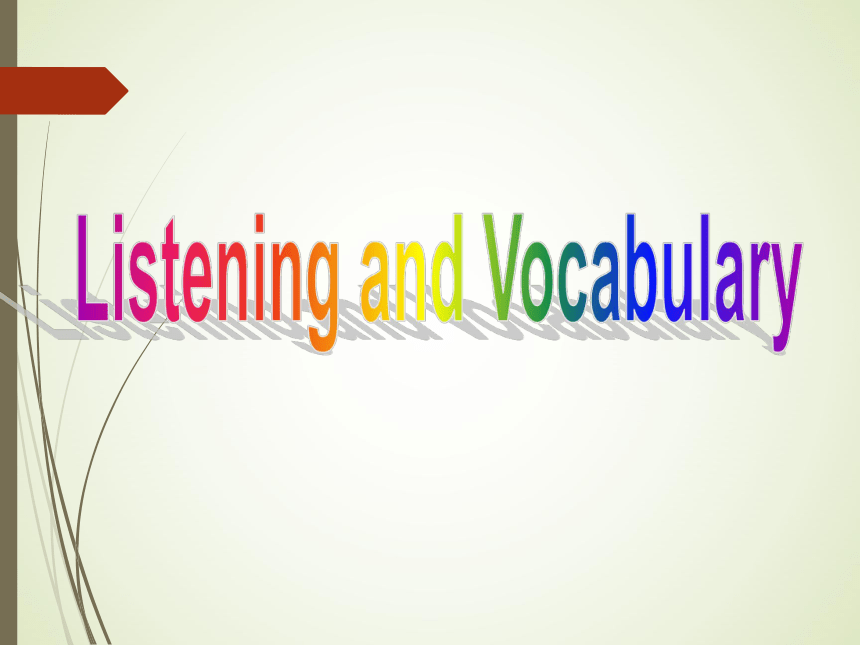
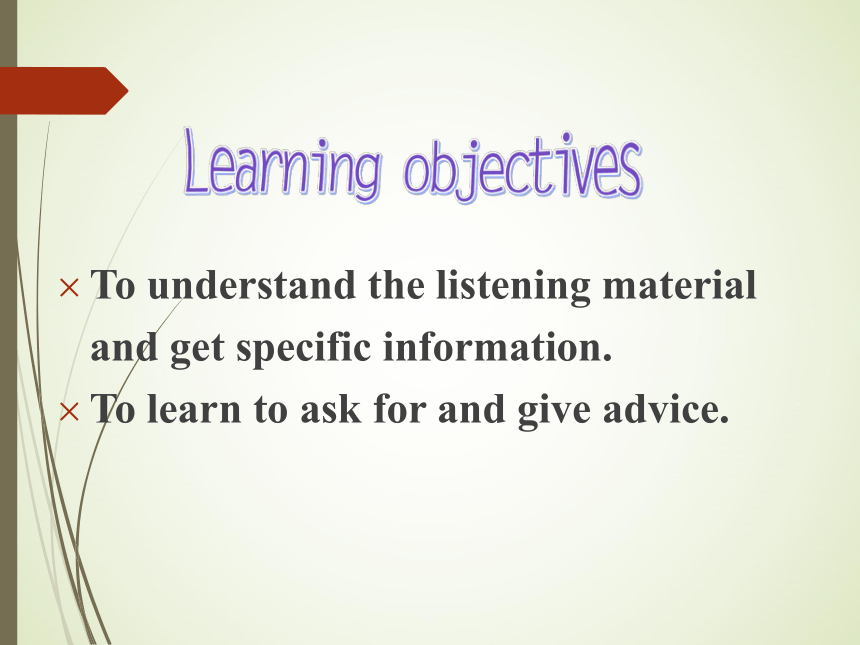
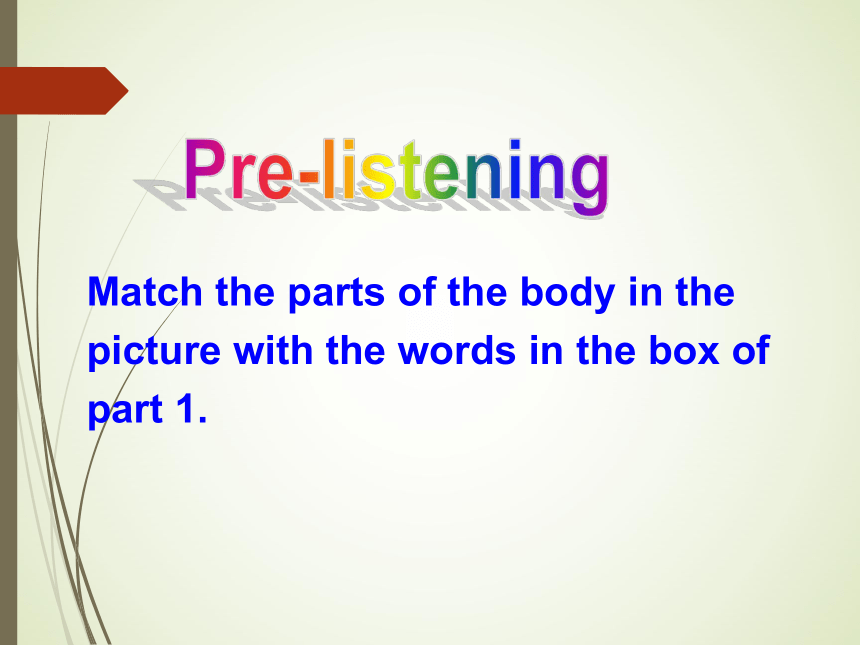
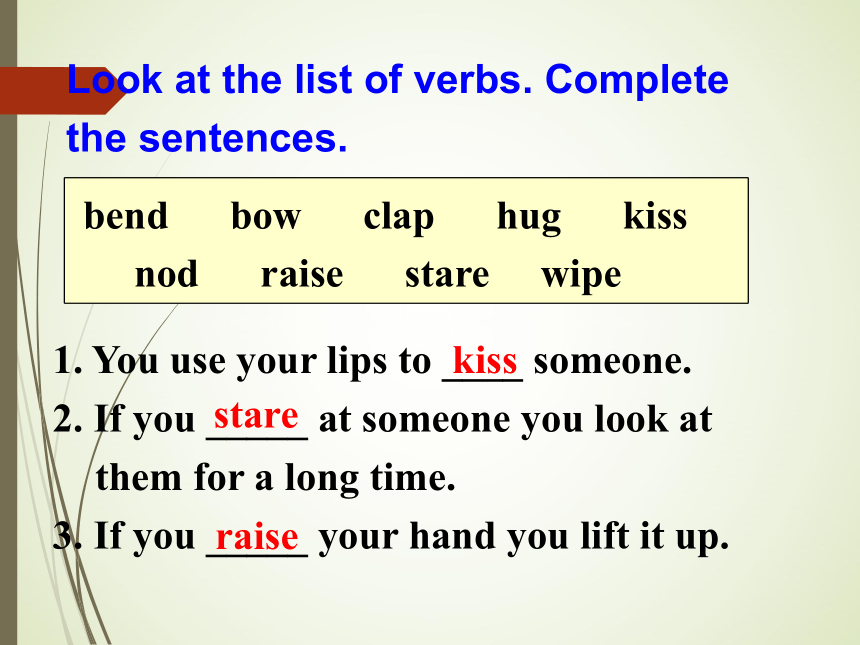

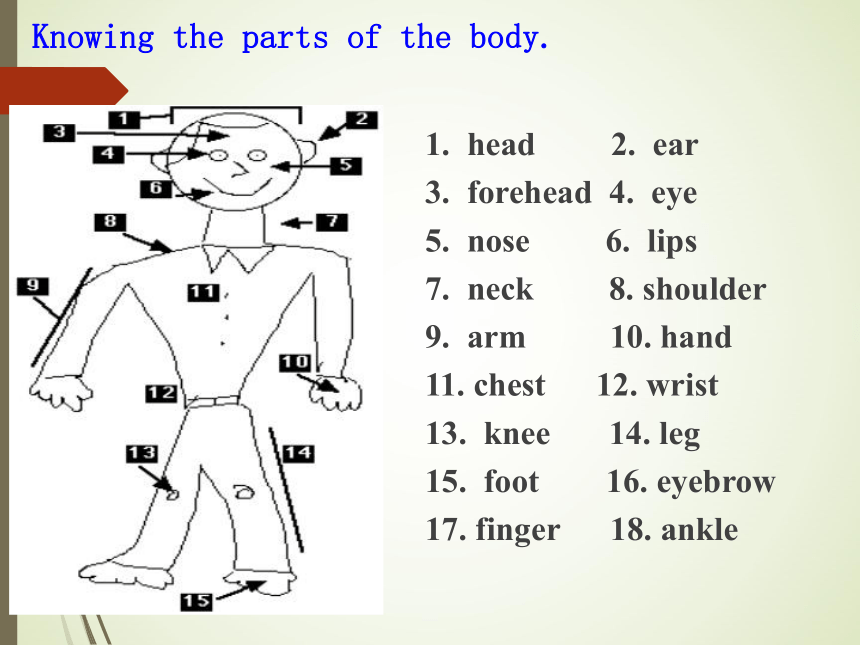
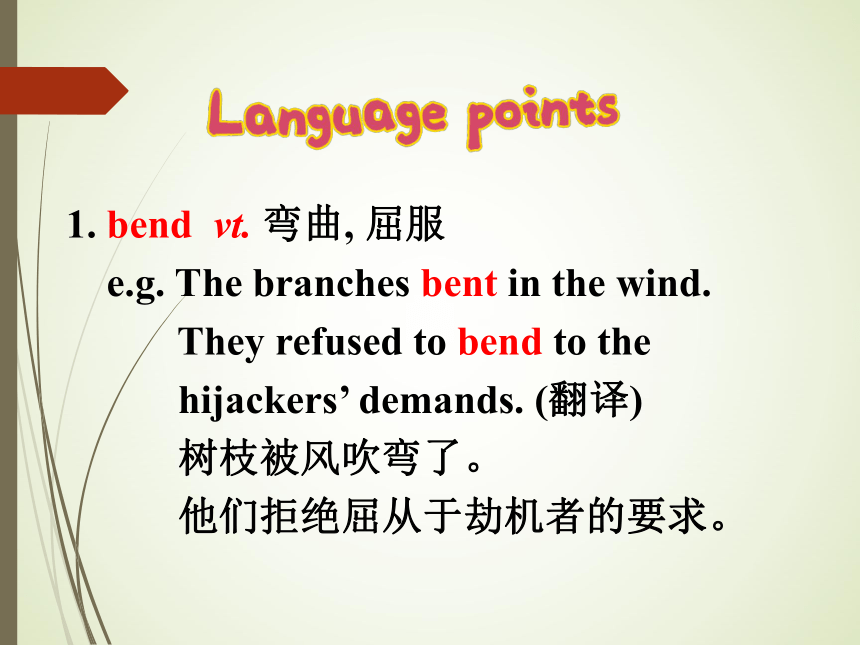
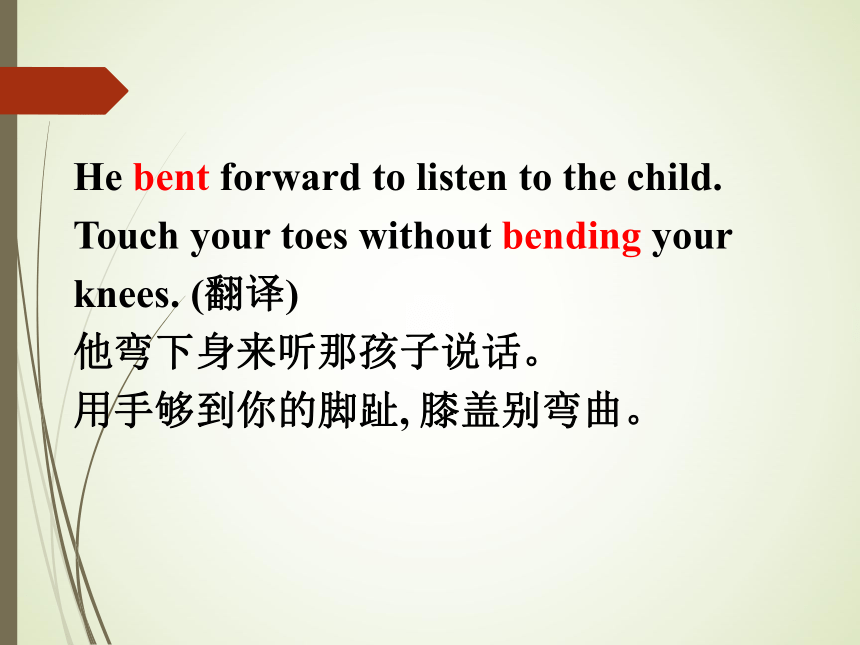
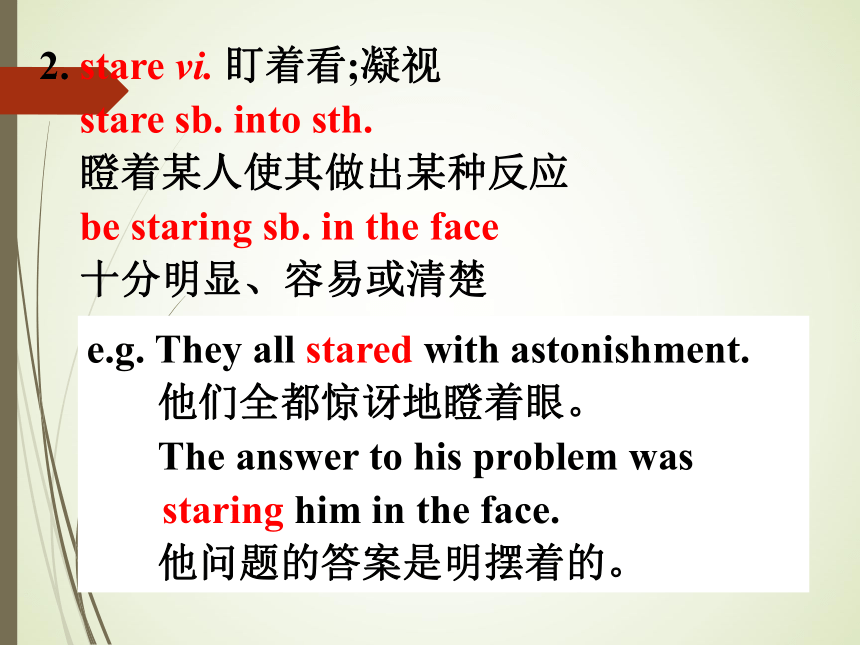
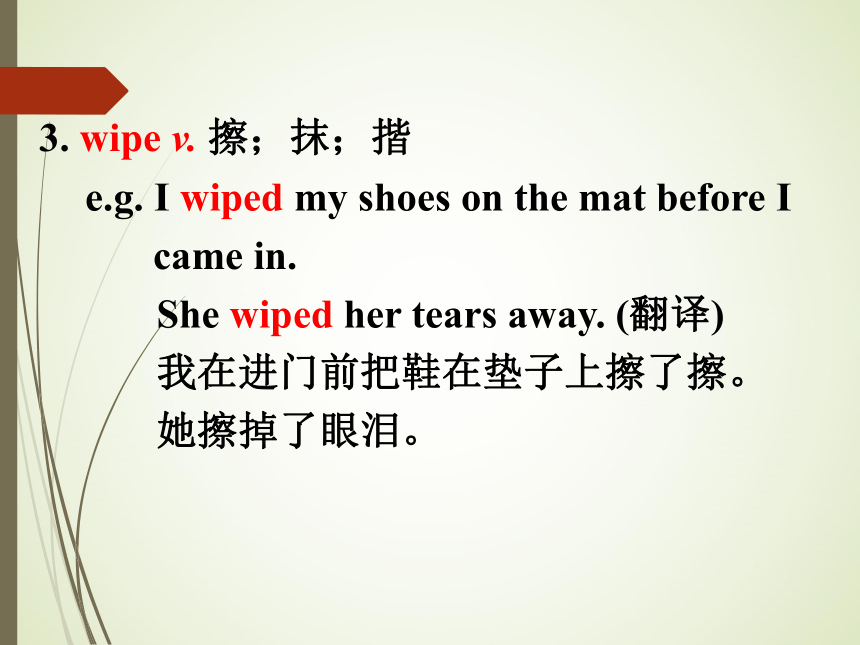
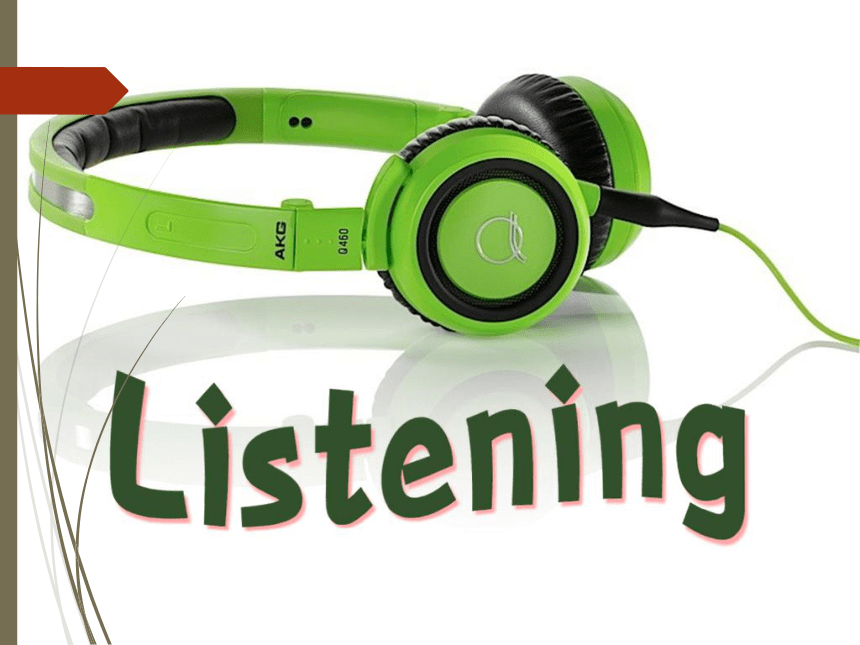
文档简介
课件43张PPT。Module 3 Body Language
and Non-verbal CommunicationListening and VocabularyTo understand the listening material and get specific information.
To learn to ask for and give advice.Match the parts of the body in the picture with the words in the box of part 1.Pre-listening1. You use your lips to ____ someone.
2.?If you _____ at someone you look at them for a long time.
3.?If you _____ your hand you lift it up. kiss stareLook at the list of verbs. Complete the sentences.raise 4.?You ____ by moving your head up
and down.
5.?When you bend your upper body
forwards you ____.
6.?You have to _____ your knees to sit down. nod bow bend 7.?If you’re hot you can ____ the sweat from your forehead
8.?At the end of a concert or a play it is usual to ____. wipe clapKnowing the parts of the body.1. head 2. ear
3. forehead 4. eye
5. nose 6. lips
7. neck 8. shoulder
9. arm 10. hand
11. chest 12. wrist
13. knee 14. leg
15. foot 16. eyebrow
17. finger 18. ankle1. bend vt. 弯曲, 屈服
e.g. The branches bent in the wind.
They refused to bend to the
hijackers’ demands. (翻译)
树枝被风吹弯了。
他们拒绝屈从于劫机者的要求。 He bent forward to listen to the child.
Touch your toes without bending your knees. (翻译)
他弯下身来听那孩子说话。
用手够到你的脚趾, 膝盖别弯曲。2. stare vi. 盯着看;凝视
stare sb. into sth.
瞪着某人使其做出某种反应
be staring sb. in the face
十分明显、容易或清楚e.g. They all stared with astonishment.
他们全都惊讶地瞪着眼。
The answer to his problem was staring him in the face.
他问题的答案是明摆着的。3. wipe v. 擦;抹;揩e.g. I wiped my shoes on the mat before I came in.
She wiped her tears away. (翻译)
我在进门前把鞋在垫子上擦了擦。
她擦掉了眼泪。Listen to a conversation between an American and a Chinese student who is going to the US. Number the topics in the order they talk about them. _____ What to talk about
_____ Gifts
_____ When to arrive for dinner
_____ What to call people
_____ How to meet new people
_____ What to say to the host when you leave
_____ When to leave the table. 1234567a.?You should shake hands when you meet new people. ____
b.?You should bring some flowers or a bottle of wine. ______Match the following pieces of advice with the topics in activity 3. c.?You should open gifts immediately.
______
d.?You shouldn’t use family names. ____
e.?You shouldn’t arrive too late. _____f.?You shouldn’t talk about politics or religion. ____
g. You mustn’t leave as soon as you finish the meal. _______
h.?You must thank your host for a wonderful evening. ______
i.?You mustn’t arrive early. _______What to talk about:
When to arrive for dinner:
How to meet new people:
When to leave the table:
Gifts:
What to call people:
What to say to the host when you leave: f e, i a gb, c dhListen to this speaker with an
American accent. When you’re invited to someone’s
home, it’s a good idea to bring a gift for
your host. It doesn’t have to be
something expensive, perhaps some
flowers or a bottle of wine. PronunciationIf you have a meal, don’t start eating
before everyone else is served. And whatever you do, don’t leave immediately after the meal is finished. Now listen to this speaker with a British accent. What do you notice about these sounds in American pronunciation?Answers:
1. in American English sounds more like
2. in American English sounds more like
3. is must more prominent in American English.
4. in American English sounds more like It’s best to avoid any heavy-going conservation topics. So avoid politics or religion completely. If your mind goes blank, try not to panic. Listen to these speakers. Do they speak in an American (US) or a British (UK) accent?And it’s usual for people to open gifts when they receive them, so don’t be surprised. That’s the way we do things…
But when you leave, be sure to thank your host for a wonderful evening. Oh, and one last thing to remember: Have a great time! 1) UK 2) UK 3) USpanic
n. v. 恐慌, 惊惶
e.g.
1) Don’t panic! 别怕!
2) She got into a panic when she
thought she’d forgotten the tickets.
她想起忘记带入场券, 顿时惊慌起来。blank adj. 空白的
n. 空白(处)
e.g. 1) His memory was completely
blank on the subject.
关于这个题目, 他已完全丧失记忆。
2) Many blank spaces are still left in the suburbs.
郊区仍留有许多空地。3) Write your name in the blank.
在空白栏中写上你的名字。
4) My mind/memory was a (complete)
blank I couldn’t think of a single
answer.
我头脑/记忆里(完全)是一片空白—
连一个答案也想不出。Look at the sentences in Listening and vocabulary activity 4 and complete the sentences below with should or must. 1. You should shake hands when you meet new people.
2. You should bring some flowers or a bottle of wine.
3. You should open gifts immediately.
4. You shouldn’t use family names.
5. You shouldn’t arrive too late. 6. You shouldn’t talk about politics or religion.
7. You mustn’t leave as soon as you finish the meal.
8. You must thank your host for a wonderful evening.
9. You mustn’t arrive early. We use the modal verb ______ to give advice.
We use the modal verb ______ to give strong advice.
You ______ means It’s a good idea to …
You _____ means It’s very important to …should must should must ConclusionDo you know…?
1) In France you ______ shake hands
every time you say hello and goodbye.
2) In Thailand you _______ touch
someone on the head, even by accident.should mustn’t Work in pairs. Guess the customs by completing the advice with should, shouldn’t, must or mustn’t. 3) In Spain you ______ wait until 10
pm before you have dinner.
4) In Japan you _________ give a
penknife as a present.
5) In Russia you _____ make a toast
every time you take a sip from
your glass. should shouldn’t must by accident 偶然的
take a sip 抿一口
make a toast 祝酒
toast v. /n. 祝酒, 干杯e.g. Let’s toast the friendship between
two countries.
让我们为两国间的友谊干杯。
I propose a toast to the health of the
guests.
我提议为来宾的健康干一杯。Asking for advice. 1) Could you give me some advice on how to improve my English?
2) Do you think I should change the plan?
3) I’d like your advice about my essay.
4) Ought I to brush up my English before I got to America?5) Should I claim two yuan a day for my novel?
6) What do you think I should do?
7) What would you advise?
8) What would you do if you were me?
9) Could you ask for some advice
about my research? Advising somebody to do something. 1) Don’t you think it might be a good idea to start a little earlier?
2) I advise you to take exercises.
3) I should say a little work would do you no harm.
4) I think you might enjoy a holiday on the beach. 5) I think you ought to find a bigger flat.
6) I think you should go on a diet.
7) I’d suggest going to see him yourself.
8) It mightn’t be a bad idea to rent a camera.
9) If I were you, I’d refuse to carry out his orders.
10) You should persist in your ambition.Advising somebody not to do something.1) I advise you not to spend too much time on computer games.
2) I don’t think you ought to give up all
hope of becoming a professional singer.
3) Don’t break your word if you want help. 4) It’s up to you but I wouldn’t do that.
5) Why don’t you give up sweets to lose
weight?
6) I would recommend you not to try
those sleeping pills.
7) If you follow my advice, you won’t
keep in touch with her. 8) You mustn’t drink too much before
driving.
9) You would be wise enough not to offend him.
10) My advice would be, don’t drive too fast. 1. Remember the words and expressions in the lesson.
2. Remember how to give advice.
and Non-verbal CommunicationListening and VocabularyTo understand the listening material and get specific information.
To learn to ask for and give advice.Match the parts of the body in the picture with the words in the box of part 1.Pre-listening1. You use your lips to ____ someone.
2.?If you _____ at someone you look at them for a long time.
3.?If you _____ your hand you lift it up. kiss stareLook at the list of verbs. Complete the sentences.raise 4.?You ____ by moving your head up
and down.
5.?When you bend your upper body
forwards you ____.
6.?You have to _____ your knees to sit down. nod bow bend 7.?If you’re hot you can ____ the sweat from your forehead
8.?At the end of a concert or a play it is usual to ____. wipe clapKnowing the parts of the body.1. head 2. ear
3. forehead 4. eye
5. nose 6. lips
7. neck 8. shoulder
9. arm 10. hand
11. chest 12. wrist
13. knee 14. leg
15. foot 16. eyebrow
17. finger 18. ankle1. bend vt. 弯曲, 屈服
e.g. The branches bent in the wind.
They refused to bend to the
hijackers’ demands. (翻译)
树枝被风吹弯了。
他们拒绝屈从于劫机者的要求。 He bent forward to listen to the child.
Touch your toes without bending your knees. (翻译)
他弯下身来听那孩子说话。
用手够到你的脚趾, 膝盖别弯曲。2. stare vi. 盯着看;凝视
stare sb. into sth.
瞪着某人使其做出某种反应
be staring sb. in the face
十分明显、容易或清楚e.g. They all stared with astonishment.
他们全都惊讶地瞪着眼。
The answer to his problem was staring him in the face.
他问题的答案是明摆着的。3. wipe v. 擦;抹;揩e.g. I wiped my shoes on the mat before I came in.
She wiped her tears away. (翻译)
我在进门前把鞋在垫子上擦了擦。
她擦掉了眼泪。Listen to a conversation between an American and a Chinese student who is going to the US. Number the topics in the order they talk about them. _____ What to talk about
_____ Gifts
_____ When to arrive for dinner
_____ What to call people
_____ How to meet new people
_____ What to say to the host when you leave
_____ When to leave the table. 1234567a.?You should shake hands when you meet new people. ____
b.?You should bring some flowers or a bottle of wine. ______Match the following pieces of advice with the topics in activity 3. c.?You should open gifts immediately.
______
d.?You shouldn’t use family names. ____
e.?You shouldn’t arrive too late. _____f.?You shouldn’t talk about politics or religion. ____
g. You mustn’t leave as soon as you finish the meal. _______
h.?You must thank your host for a wonderful evening. ______
i.?You mustn’t arrive early. _______What to talk about:
When to arrive for dinner:
How to meet new people:
When to leave the table:
Gifts:
What to call people:
What to say to the host when you leave: f e, i a gb, c dhListen to this speaker with an
American accent. When you’re invited to someone’s
home, it’s a good idea to bring a gift for
your host. It doesn’t have to be
something expensive, perhaps some
flowers or a bottle of wine. PronunciationIf you have a meal, don’t start eating
before everyone else is served. And whatever you do, don’t leave immediately after the meal is finished. Now listen to this speaker with a British accent. What do you notice about these sounds in American pronunciation?Answers:
1. in American English sounds more like
2. in American English sounds more like
3. is must more prominent in American English.
4. in American English sounds more like It’s best to avoid any heavy-going conservation topics. So avoid politics or religion completely. If your mind goes blank, try not to panic. Listen to these speakers. Do they speak in an American (US) or a British (UK) accent?And it’s usual for people to open gifts when they receive them, so don’t be surprised. That’s the way we do things…
But when you leave, be sure to thank your host for a wonderful evening. Oh, and one last thing to remember: Have a great time! 1) UK 2) UK 3) USpanic
n. v. 恐慌, 惊惶
e.g.
1) Don’t panic! 别怕!
2) She got into a panic when she
thought she’d forgotten the tickets.
她想起忘记带入场券, 顿时惊慌起来。blank adj. 空白的
n. 空白(处)
e.g. 1) His memory was completely
blank on the subject.
关于这个题目, 他已完全丧失记忆。
2) Many blank spaces are still left in the suburbs.
郊区仍留有许多空地。3) Write your name in the blank.
在空白栏中写上你的名字。
4) My mind/memory was a (complete)
blank I couldn’t think of a single
answer.
我头脑/记忆里(完全)是一片空白—
连一个答案也想不出。Look at the sentences in Listening and vocabulary activity 4 and complete the sentences below with should or must. 1. You should shake hands when you meet new people.
2. You should bring some flowers or a bottle of wine.
3. You should open gifts immediately.
4. You shouldn’t use family names.
5. You shouldn’t arrive too late. 6. You shouldn’t talk about politics or religion.
7. You mustn’t leave as soon as you finish the meal.
8. You must thank your host for a wonderful evening.
9. You mustn’t arrive early. We use the modal verb ______ to give advice.
We use the modal verb ______ to give strong advice.
You ______ means It’s a good idea to …
You _____ means It’s very important to …should must should must ConclusionDo you know…?
1) In France you ______ shake hands
every time you say hello and goodbye.
2) In Thailand you _______ touch
someone on the head, even by accident.should mustn’t Work in pairs. Guess the customs by completing the advice with should, shouldn’t, must or mustn’t. 3) In Spain you ______ wait until 10
pm before you have dinner.
4) In Japan you _________ give a
penknife as a present.
5) In Russia you _____ make a toast
every time you take a sip from
your glass. should shouldn’t must by accident 偶然的
take a sip 抿一口
make a toast 祝酒
toast v. /n. 祝酒, 干杯e.g. Let’s toast the friendship between
two countries.
让我们为两国间的友谊干杯。
I propose a toast to the health of the
guests.
我提议为来宾的健康干一杯。Asking for advice. 1) Could you give me some advice on how to improve my English?
2) Do you think I should change the plan?
3) I’d like your advice about my essay.
4) Ought I to brush up my English before I got to America?5) Should I claim two yuan a day for my novel?
6) What do you think I should do?
7) What would you advise?
8) What would you do if you were me?
9) Could you ask for some advice
about my research? Advising somebody to do something. 1) Don’t you think it might be a good idea to start a little earlier?
2) I advise you to take exercises.
3) I should say a little work would do you no harm.
4) I think you might enjoy a holiday on the beach. 5) I think you ought to find a bigger flat.
6) I think you should go on a diet.
7) I’d suggest going to see him yourself.
8) It mightn’t be a bad idea to rent a camera.
9) If I were you, I’d refuse to carry out his orders.
10) You should persist in your ambition.Advising somebody not to do something.1) I advise you not to spend too much time on computer games.
2) I don’t think you ought to give up all
hope of becoming a professional singer.
3) Don’t break your word if you want help. 4) It’s up to you but I wouldn’t do that.
5) Why don’t you give up sweets to lose
weight?
6) I would recommend you not to try
those sleeping pills.
7) If you follow my advice, you won’t
keep in touch with her. 8) You mustn’t drink too much before
driving.
9) You would be wise enough not to offend him.
10) My advice would be, don’t drive too fast. 1. Remember the words and expressions in the lesson.
2. Remember how to give advice.
